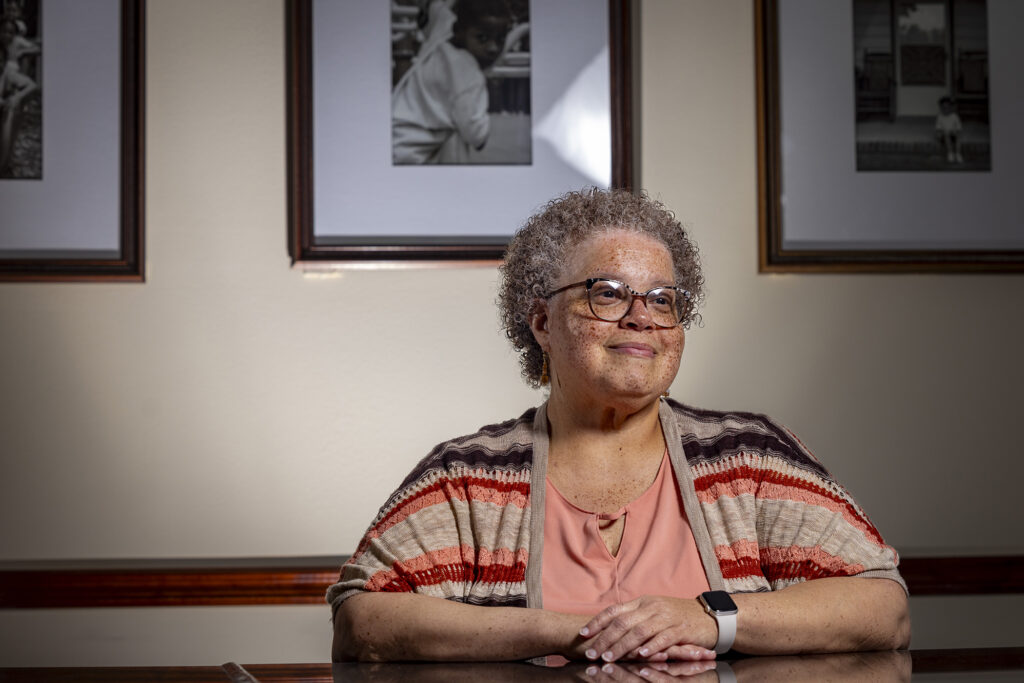Tracy Anderson truly cares about those around her.
As assistant director of UGA’s Center for Family Research, she and her staff help facilitate pioneering research on the ways in which stress affects family relationships, youth development and adult health, particularly within Black American populations in the South. As a daughter and friend, she prioritizes time with those she loves.
“I want to leave a mark on this world that somebody benefited from,” she said.
Anderson is a Triple Dawg, and she initially honed her interest in serving others by getting her bachelor’s degree in health promotion and behavior in the College of Public Health. She intended to work in AIDS education but accepted a position as a case manager at a behavioral health facility in Macon. It was an awakening for Anderson, whose clients dealt with severe and chronic mental health issues.
After four years, she wanted more education and came back to UGA to earn her master’s degree in social work. As part of that program, she had a yearlong internship with the state’s Division of Aging Services and decided to apply for a position with the Athens Community Council on Aging as a social services coordinator. She eventually transferred to their senior center and worked there for three years.
“In my heart, I knew I was coming back to UGA,” she said.
Her journey back began as part-time data collector for the Center for Family Research. Not long after that, the center began testing an intervention initiative called the Strong African American Families (SAAF) Program, and Anderson was hired as an assistant intervention coordinator to help set up the infrastructure. She was soon promoted to intervention coordinator and later began supervising the center’s active research studies.
“I appreciate the center does research primarily with African American families who live in rural communities. So many of the things we’ve studied and we’ve published on are not normed on families like mine,” she said. “I saw that connection.”
Eventually, Anderson’s title was changed to assistant director, and she earned her doctorate in adult education. Now, she oversees the dissemination of SAAF by promoting the program, coordinating training and providing technical assistance to organizations that purchase SAAF.
“It is the highlight of my career here,” she said. “I was out there seeing families engage with this content and seeing how it worked. Now, I get the opportunity to travel around the country to introduce this program that I love.”
In addition to disseminating SAAF programs, Anderson’s role varies from administrative work like supervising her staff and being the liaison between the center’s different offices to programmatic work such as hosting trainings meetings and finding time for research and editing.
“The most important part of my work is making sure that we are doing good research. So, supporting our project coordinators to make sure we’re collecting the data that needs to be collected and ultimately that we’re fulfilling what’s required of us through the funding we get,” she said.
The center’s studies have garnered more than $100 million in funding for research and randomized prevention trials from NIH research and infrastructure grants, in addition to foundation and state funding. That work includes faculty researchers from psychology, human development and family science, sociology, and health promotion and behavior.
“This gives us some insight into what’s going on with Black families,” Anderson said. “I think this research is important in any marginalized community to make sure you’re getting all of the voices. I understand how important it is to have different perspectives reflected.”
The work she does outside of UGA is just as important to Anderson. She’s highly active in her church, serving as a trustee, and spends as much time as she can with her parents. Anderson likes to cook and take weekend trips when she can. She also participates in a few book clubs and enjoys writing herself.
Whether it’s in the office or at home, Anderson continues to serve others.
“It’s important to us at the center that we are able to bring the lives, the stories and the experiences of marginalized communities to light. We want to make sure that voices that aren’t always heard, sought after or appreciated get out there,” she said.
